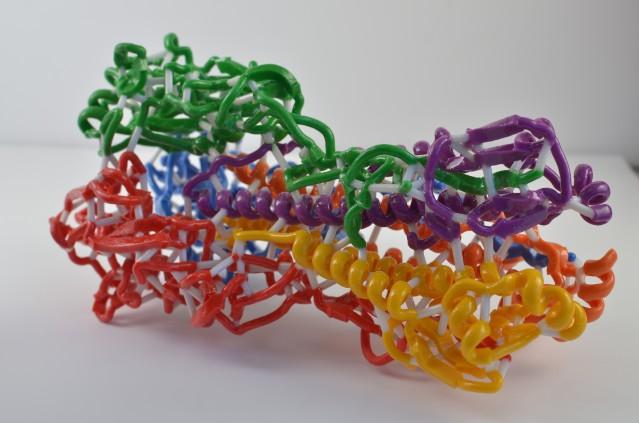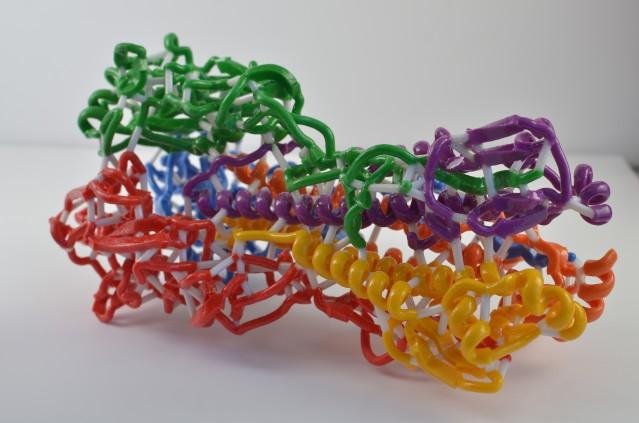
Credit: NIH
WHAT: People with higher levels of antibodies against the stem portion of the influenza virus hemagglutinin (HA) protein have less viral shedding when they get the flu, but do not have fewer or less severe signs of illness, according to a new study published in mBio. HA sits on the surface of the influenza virus to help bind it to cells and features a head and stem region. Scientists only recently discovered that humans naturally generate anti-HA stem antibodies in response to flu infection, and this is the first study of its kind to evaluate pre-existing levels of these specific antibodies as a predictor of protection against influenza. The findings could have implications for flu vaccine development, according to the authors. Scientists at the National Institute of Allergy and Infectious Diseases (NIAID), part of the National Institutes of Health, conducted the research.
The study team has explored immune responses to two influenza surface proteins: HA–the main target of traditional seasonal flu vaccines–and neuraminidase (NA). The head region of HA is constantly changing, which is why influenza vaccine strains must be updated each year. The HA stem region, however, is less susceptible to change, making it a potential target for novel vaccines aimed at broader, more durable protection.
In the new analysis, investigators sought to understand the role of pre-existing anti-HA stem antibodies in protection against influenza using data from a healthy volunteer influenza challenge trial that took place in 2013 at the NIH Clinical Center in Bethesda, Maryland. Led by NIAID's Matthew J. Memoli, M.D., the trial enrolled 65 healthy volunteers aged 18 to 50 years. Participants stayed in a specially designed isolation and infection control unit throughout the study. Investigators measured participants' baseline levels of anti-HA stem antibodies, infected them with a 2009 H1N1 influenza virus, and then measured levels of anti-HA stem antibodies again.
They found that all volunteers had anti-HA stem antibodies at baseline, although levels varied, and 64 percent of participants had increased levels after infection. However, people with higher levels before exposure had smaller increases, suggesting there could be a limit that humans can achieve naturally. Trial investigators also closely monitored participants' symptoms and the amount of influenza virus they shed from the nose, which may indicate how contagious someone is. Similar to findings regarding anti-HA head antibodies, they found that participants with higher baseline levels of anti-HA stem antibodies had reduced viral shedding, but no significant reduction in the duration or severity of illness.
The results show that people naturally make anti-HA stem antibodies, but that responses vary significantly, and also these antibody levels are not independent predictors of whether someone becomes sick or if so, how severely. The authors note that antibodies against NA remain the only identified predictor of disease severity, according to previously reported trial data.
Although the data are limited, the results have implications for novel influenza vaccine design, according to the authors. They note future strategies ideally should focus on more than one aspect of immunity. "Careful consideration of the complexity of influenza immune protection and evaluation of all aspects of the anti-influenza immune responses will ultimately be necessary in the development of a successful broadly protective or universal influenza vaccine," the authors said.
###
ARTICLE: J Park et al. Evaluation of pre-existing anti-hemagglutinin stalk antibody as a correlate of protection in a healthy volunteer challenge with influenza A/H1N1 pdm virus. mBio DOI: 10.1128/mBio.02284-17 (2018).
WHO: NIAID Director Anthony S. Fauci, M.D., is available for comment. Matthew J. Memoli, M.D., director of the Clinical Studies Unit in NIAID's Laboratory of Infectious Diseases, is also available for comment.
CONTACT: To schedule interviews, please contact Jennifer Routh, (301) 402-1663, [email protected]
NIAID conducts and supports research–at NIH, throughout the United States, and worldwide–to study the causes of infectious and immune-mediated diseases, and to develop better means of preventing, diagnosing and treating these illnesses. News releases, fact sheets and other NIAID-related materials are available on the NIAID website.
About the National Institutes of Health (NIH): NIH, the nation's medical research agency, includes 27 Institutes and Centers and is a component of the U.S. Department of Health and Human Services. NIH is the primary federal agency conducting and supporting basic, clinical, and translational medical research, and is investigating the causes, treatments, and cures for both common and rare diseases. For more information about NIH and its programs, visit http://www.nih.gov.
Media Contact
Jennifer Routh
[email protected]
301-402-1663
@NIAIDNews
http://www.niaid.nih.gov
Related Journal Article
http://dx.doi.org/10.1128/mBio.02284-17





